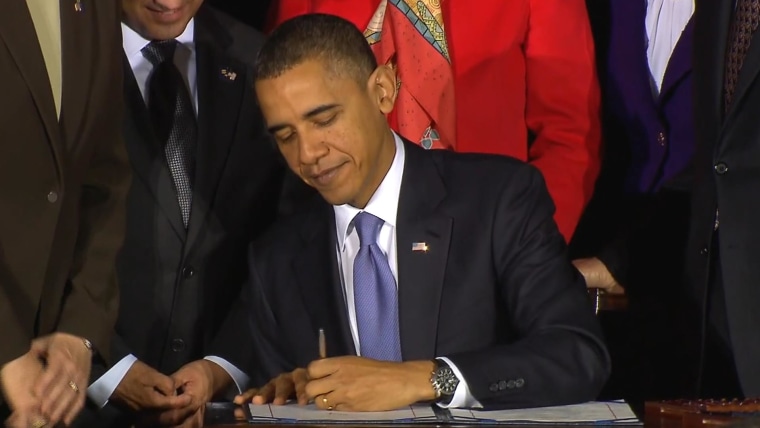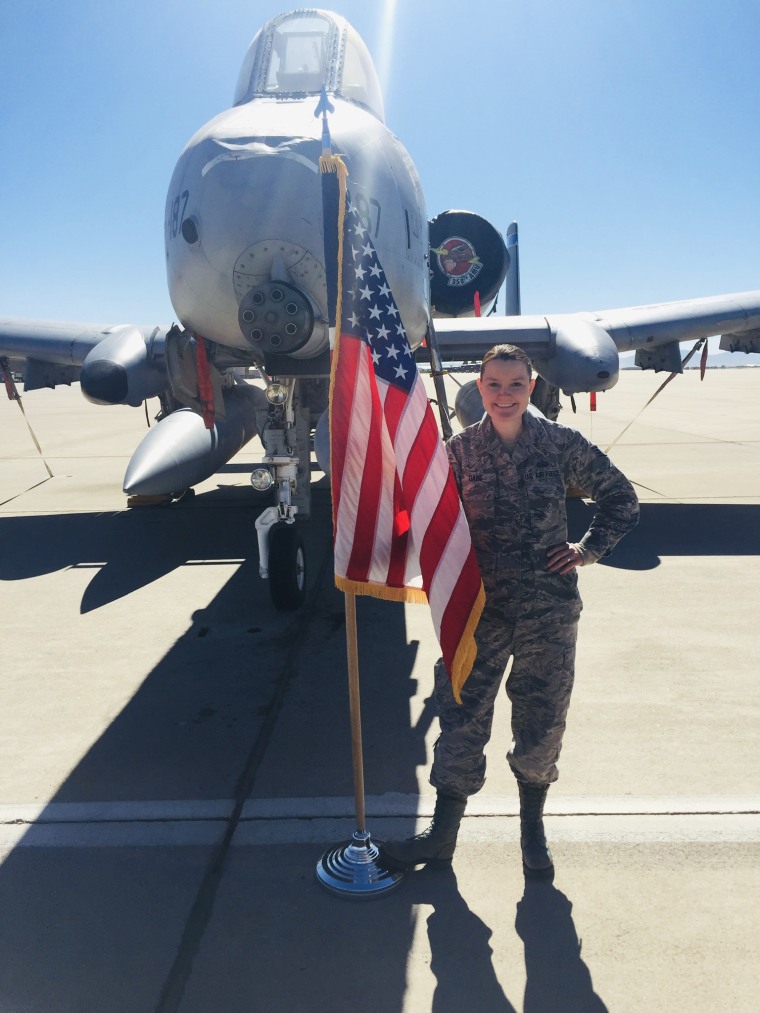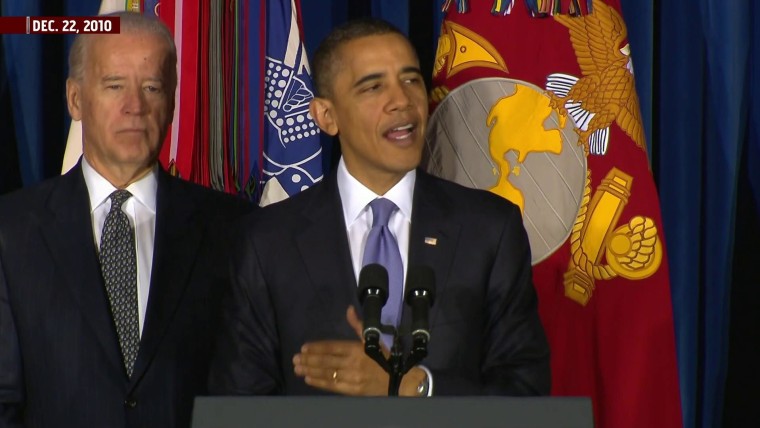Decade after ‘Don’t Ask, Don’t Tell’ Repeal, a ‘Hurtful’ Legacy Remains
Growing up in a military family in Atlanta, Joshua Gravett said he knew he wanted to follow in the footsteps of his father, Eddie, and older brother, Justin, both sergeants first class in the Army. There was just one problem: He was gay.
Despite the military’s policy at the time of prohibiting gay men and lesbians from serving openly, Gravett, then just 17, enlisted in the Army in 2003 and kept his sexuality a secret for eight years.

“You can’t have any type of relationships whatsoever. I wouldn’t be seen with anybody else that could be considered gay,” Gravett said, noting that just being suspected of being gay could get you kicked out.
President Barack Obama signed a bill setting in motion the repeal of “don’t ask, don’t tell” on Dec. 22, 2010, but it wasn’t until after the policy was officially repealed in 2011 that Gravett finally started to come out to his friends and family. He also recalled the relief he felt just being able to put a photo of his partner on his desk at Fort Bragg, North Carolina, and bring a same-sex date to a military formal.
“I could just be myself without risking the loss of my career that I had already put almost a decade into,” Gravett, now 35 and a sergeant first class stationed in Texas, told NBC News. “It was like a huge weight lifted off me.”
Gravett recalled being “happy” the day President Barack Obama signed the repeal bill but said he “still couldn’t be out until it took effect” nine months later.

2010: Obama signs repeal of ‘don’t ask, don’t tell’
“It was almost like finding out you are getting promoted, but it isn’t real until it actually happens,” he said.
An estimated 13,000 service members were discharged in the 17 years the policy was in effect, according to data the military provided to The Associated Press.
A decade after the demise of “don’t ask, don’t tell,” much has changed for LGBTQ Americans, but several gay service members and military experts say the policy’s dark shadow still lingers.
A defunct policy’s lingering shadow
When President Bill Clinton signed “don’t ask, don’t tell” into law in 1993, it was a compromise between the White House and Congress to end the existing policy of outright banning gay service members that had dated to World War II. Under the new policy — which passed 77-22, with bipartisan support — gay men, lesbians and bisexuals were in theory permitted to serve in the military, but they would be “separated from the armed forces” if they revealed themselves to be homosexual or bisexual, tried to marry a person of the same sex, or there was evidence they had engaged in same-sex sexual activity.
Gravett said the policy has left a “hurtful” legacy, and he mentioned being a part of several Facebook groups where former service members lament losing their military careers because of “don’t ask, don’t tell” and not being able to serve again.
He also noted that many service members who were ousted under the policy are not aware that they may be able to seek remedies from the military.
“Most people that got out under ‘don’t ask, don’t tell’ can get their discharges upgraded from general discharge to honorable discharge,” he said, encouraging those who haven’t tried already to do so.

Jennifer Dane, a Texas native who joined the military at 22 and served as an intelligence analyst in the Air Force from 2010 to 2016, said that when it comes to “don’t ask, don’t tell,” there are “still unintended consequences that aren’t even explored to the fullest, even 10 years later.”
Dane, now 33, said she was stationed in Tucson, Arizona, when she was investigated under “don’t ask, don’t tell” after reporting that she has been sexually assaulted by an airman. Over the course of the investigation, Dane said her sexuality came to light, which turned the investigation toward her. The investigation stopped after Obama signed the repeal bill, according to Dane.
Now the executive director of the Modern Military Association of America, a nonprofit that advocates for LGBTQ veterans and their families, Dane said she would like to see some of these past “wrongs” caused by the policy “written right,” like a public apology from the government or even just “making sure that we don’t do policies that are harmful” again.
Dane added that some LGBTQ veterans who were discharged under “don’t ask, don’t tell” still do not get access to medical care, the GI Bill and military pensions. This does not include the emotional trauma that service members endured under the policy, she added.
Related
‘Chosen families’ ruptured: How Covid-19 hit an LGBTQ lifeline
Aaron Belkin is the founder of the Palm Center, an independent research institute in San Francisco that focuses on LGBTQ military issues. His organization helped make the case for the repeal of “don’t ask, don’t tell.”
“We did 10 years of research into that question of whether it’s true that gay lesbians hurt the military, and what our research found was that it’s discrimination that hurts the military, not gays and lesbians,” Belkin said.
Belkin, Dane and Gravett all drew parallels between the former ban on gays and lesbians serving openly in the military and the current ban on transgender service members from doing so.
“The Trump administration’s transgender ban is ‘don’t ask, don’t tell for transgender troops, and the similarities are striking,” Belkin said. His organization, using 2016 data from the Department of Defense, estimates there are currently 14,700 transgender service memberson active duty or in the reserves.
‘A new era of LGBTQ rights’
One of the thousands of currently serving transgender service members is Iowa native Samuel Payntr. Now 22, Payntr began serving openly as a transgender man in the Navy at 19 when he got to his ship stationed in Norfolk, Virginia. He began hormone treatment the day before the ban on trans troops serving openly took effect on April 11, 2019. He said that while some were accepting of his transition, others weren’t sure how to respond, because it was seen as a “gray area” at the time.
“I had to really be careful about what I said around some people regarding my personal life and my sexual orientation in my transition, because there were quite a few people that had very negative remarks,” said Paytnr, who is able to serve openly as transgender because he joined the military before the transgender ban was reinstated. “I’ve had some kind of bad things happen, but the good kind of always outweigh the bad with the people that did support me.”

Marking 10th anniversary of Don’t Ask, Don’t Tell repeal
Transgender individuals with no history or diagnosis of gender dysphoria are technically still allowed to join the military and serve under the policy, though they must do so as their birth sex. Payntr explained that some hormone treatments make some service members ineligible to serve, adding he knows both trans service members who were terminated after the ban went into effect and those who were not depending on their diagnosis.
“Luckily, depending on the command we were at or the branch we were in, we had the people who were very knowledgeable in our transition defend us and be like, ‘No, this does not affect your service,’ and that’s literally what happened to me and quite a few other people that I know that are in the Navy who are transitioning,” he said.
Related
Biden talked a big game on LGBTQ rights. Here’s what his agenda may look like.
In his policy platform, President-elect Joe Biden stated that he will “reverse the transgender military ban.” And since the ban was enforced as a presidential directive, Biden would be able to reverse it unilaterally. Payntr expressed optimism that Biden will make good on this promise.
At the 2020 International LGBTQ Leaders Conference this month, Biden honored Speaker Nancy Pelosi, D-Calif., for her work in repealing “don’t ask, don’t tell” a decade ago and appeared to hint at a future repeal of the current trans military ban.
“I can’t wait to work together with you again and to continue to fight for full equality and usher in a new era of LGBTQ rights and the entire movement,” said Biden, who takes office on Jan. 20.